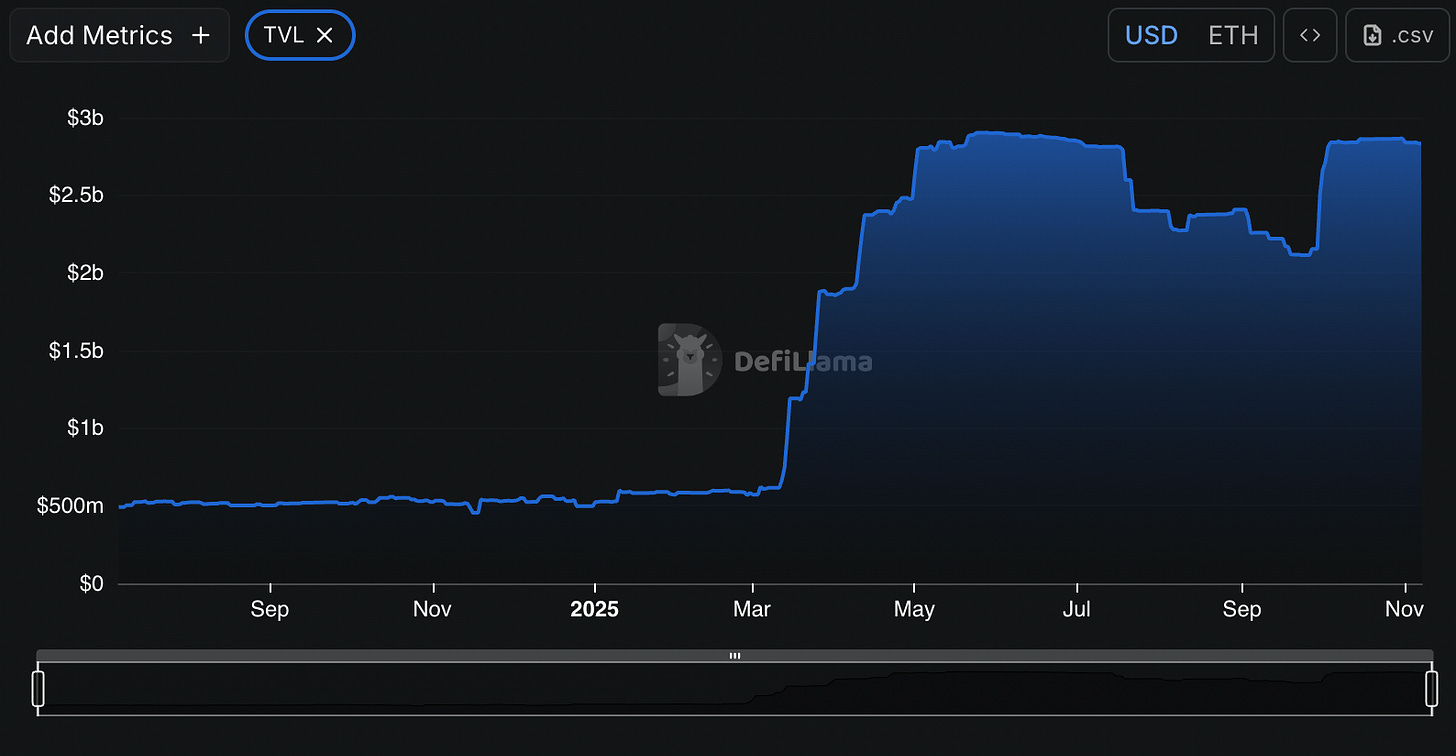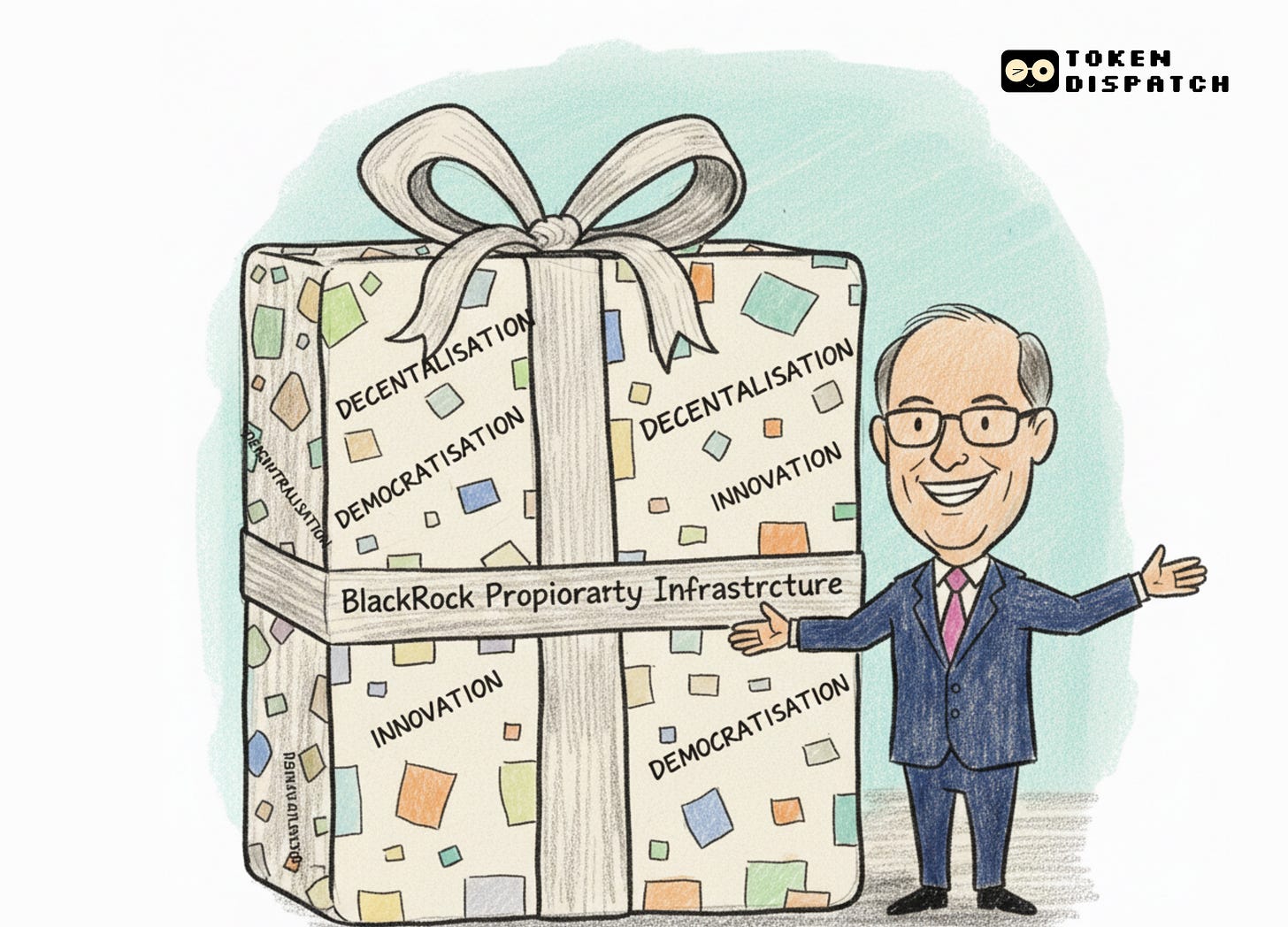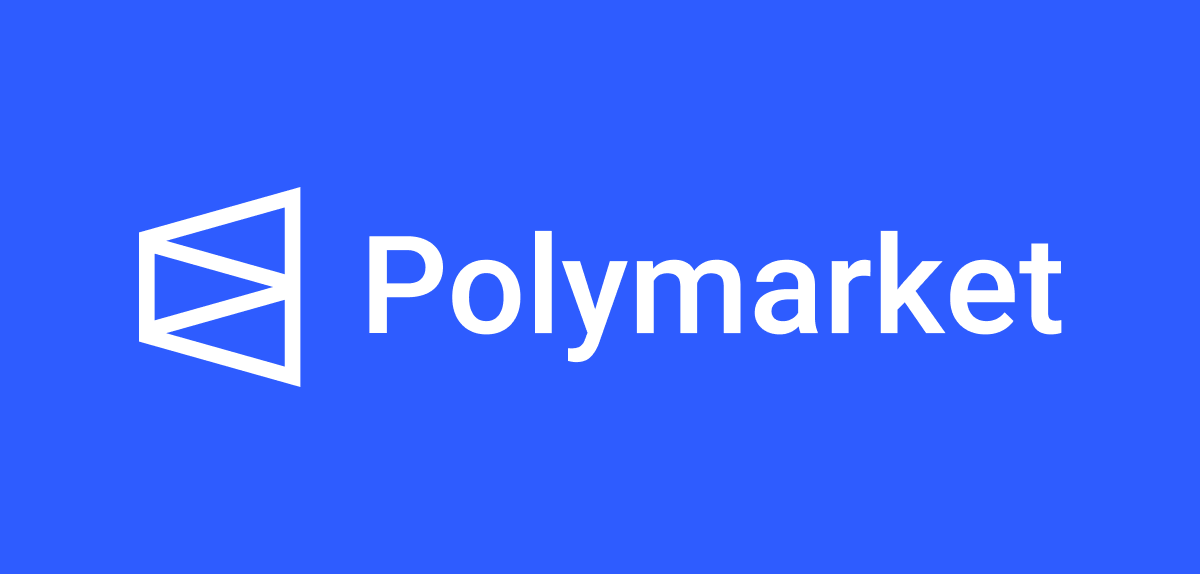Decentralisation, But Make It BlackRock 🪨
On blockchain rails, proprietary control, and the $68 trillion infrastructure trick.
There’s a moment in every revolution when you realise the rebels have won. Not because they have overthrown the system, but because they have become the system.
Watching Larry Fink talk about tokenisation with the same enthusiasm as a 2017 ICO founder is genuinely weird. This is the same guy who called Bitcoin an “index of money laundering” back in 2017. Now, he’s on CNBC saying that crypto has “a vital role” in diversified portfolios and that “every financial asset will be tokenised.”
What changed?
I don’t think Fink had some Damascus moment where he finally understood Satoshi’s whitepaper. I think he realised something more practical: if you can’t beat them, co-opt them. And if you’re going to co-opt them, do it so thoroughly that in ten years, people won’t remember there was ever an alternative.
That’s what BlackRock’s tokenisation plan is really about. And it’s brilliant in a dystopian way.
Polymarket: Where Your Predictions Carry Weight
Bet on the future by trading shares in outcomes, elections, sports, markets, you name it. Polymarket turns collective wisdom into real-time probabilities.
Now merged with X, predictions integrated with live social insights from Grok & X posts.
Think you know what’s coming next? Prove it.
Okay, so let me break this down, because BlackRock is very good at making this sound complicated and visionary when it’s actually pretty straightforward.
BlackRock manages $13.5 trillion. They’ve identified that the world needs about $68 trillion in infrastructure investment by 2040 — new power grids, data centers, bridges, ports, and all that boring-but-essential stuff that makes modern life work. Governments are broke. Banks are constrained. So, where’s the money supposed to come from?
Regular people’s savings. Your money. My money. The $25 trillion sitting in U.S. bank accounts and money market funds, earning almost nothing.
The problem is that nobody wants to lock up their savings for 30 years in an illiquid infrastructure project. You need access to your money. Maybe not today, maybe not tomorrow, but you need to know you can get it if you need it. That’s why it’s sitting in a bank account in the first place.
BlackRock’s solution? Tokenisation. They’re going to put these infrastructure assets on a blockchain, fractionalise them into tiny pieces, and make them tradeable 24/7. Suddenly, that 30-year bridge project looks less scary because, hey, you can sell your tokens anytime. It’s liquid.
Except... is it?
Here’s where my philosophical side kicks in. What even is liquidity?
If I own a house, that’s illiquid. I can’t instantly convert it to cash. But if I own shares in a REIT that owns houses, that’s liquid, I can sell the shares immediately. The houses haven’t changed. They’re still houses. But somehow, the financial instrument representing them has become liquid.
Tokenisation does the same thing, just more so. BlackRock wants to take a data centre (illiquid) and create tradeable tokens representing ownership in that data centre (liquid). You can trade the tokens 24/7 on a blockchain. Problem solved, right?
Not quite. Because the asset is still illiquid.
The data center still takes 20 years to generate returns. The bridge still takes 30 years to pay for itself. What tokenisation does is distribute that illiquidity across many people, each of whom thinks they have liquidity because they can sell to someone else.
This isn’t inherently bad and financial markets do this all the time. But let’s be honest about what’s happening. BlackRock isn’t solving the liquidity problem. They’re solving the perception problem. They’re making illiquid assets feel liquid, which is actually more impressive than making them actually liquid, because it means people will voluntarily move their money into these investments.
I can clearly see the centralisation of decentralisation.
BlackRock is not even being subtle about it. They’re explicitly building proprietary tokenisation infrastructure. Not using Ethereum (too decentralised, can’t control it). Not using public blockchains for the important stuff (though they’ll use them when convenient, like for their BUIDL fund to tap into DeFi liquidity). They’re joining private permissioned blockchains with Goldman Sachs and BNY Mellon.

Let me repeat that: Private. Permissioned. Blockchains.
Do you know what that is? That’s a database. A really fancy, expensive database with cryptographic signatures, but still, it’s a database that BlackRock controls.
I’m not even mad about it. I’m kind of impressed. It takes genuine chutzpah to look at a technology designed to eliminate you, and figure out how to use it to make yourself more essential. It’s like if the recording industry had invented Napster.
Let’s walk through what BlackRock is building, because the scope is kind of stunning:
The Platform: They’re creating the infrastructure on which tokenised assets will exist. Not using someone else’s blockchain, but building their own rails, integrated with their Aladdin risk management system.
The Compliance Layer: Their “sToken framework” bakes KYC/AML directly into smart contracts. Transfer limits, ownership rights, jurisdictional restrictions, all enforced by code. Their code.
The Custody: They hold the actual assets. You own tokens representing those assets, but BlackRock has the bridges, the data centers, the real estate.
The Distribution: Through their ETF platform, their institutional relationships, and their partnerships with Securitise and others.
The Pricing: Because they control the issuance and have access to the data (thanks to acquiring Preqin), they effectively control price discovery for these tokenised assets.
So like... what’s decentralised about this? The blockchain? Great. The technology is decentralised while the power is completely centralised.
Here’s a detail I find fascinating: Vanguard — whose executives have publicly stated that Bitcoin has “no inherent economic value”— is now the largest shareholder in MicroStrategy, a company that exists solely to hold Bitcoin.
How? Through index funds. Vanguard is required to buy whatever’s in the index, even if they think it’s a bad idea.
Now, imagine BlackRock succeeds in tokenising everything. Tokenised ETFs get added to indices. Index funds, which make up about 40% of the U.S. stock market— are forced to buy them. Trillions of passive capital will flow into BlackRock’s ecosystem automatically, whether it makes sense or not.
This is where the real genius lies. BlackRock isn’t trying to convince everyone that tokenisation is good. They’re trying to make it inevitable. Once it’s in the indices, the money flows automatically.
The $68 Trillion Sleight of Hand
So back to that infrastructure funding gap—$68 trillion. An enormous sum. Where’s it coming from?
BlackRock’s pitch is essentially: “We’ll tokenise these infrastructure assets, make them accessible to regular investors through fractional ownership, and democratise access to previously exclusive investments.”
Which sounds great. Except notice what’s happened: Your liquid savings (in a bank account, available whenever you need it) have now funded an illiquid infrastructure project (locked up for decades). The tokenisation made you comfortable doing this by creating the appearance of liquidity.
Your capital is now illiquid. You just don’t feel it because you can trade your tokens.
Again, this isn’t necessarily evil. Infrastructure needs funding. Your savings need yield. But let’s not pretend this is purely about innovation. It’s about finding a socially acceptable way to move retail savings from safe, liquid instruments into risky, illiquid ones. Tokenisation is just the psychological wrapper that makes this palatable.
So what’s really going on?
I think about this late at night (yes, I’m fun at parties), and here’s what keeps coming back to me:
BlackRock has a problem which is a massive infrastructure funding gap, and the only realistic source of capital is retail savings, but people don’t want to lock up their money for 30 years.
They have a solution, which is that tokenisation creates the appearance of liquidity, making people more comfortable moving savings into illiquid assets.
They have an opportunity: By building proprietary infrastructure, they can control this entire ecosystem — issuance, compliance, custody, distribution, pricing — while using “democratisation” language that makes it sound like they’re doing you a favour.
But this might actually work. Not because it’s the best solution, but because BlackRock is so enormous that they can make it the only solution. Once tokenised products are in major indices, the capital flows automatically. Once the capital flows, the ecosystem gets built. Once the ecosystem exists, alternatives look quaint.
I’m not saying tokenisation is inherently bad. I’m not even sure it is. Financial innovation usually creates winners and losers, and the losers are usually the people who don’t understand what’s happening until it’s too late.
What bothers me, however, is the language being used here: “Democratisation.” “Finishing the job started 400 years ago.” “Bringing finance to the people.”
BlackRock isn’t bringing finance to the people. They’re bringing people’s money to infrastructure projects that need funding. That’s not the same thing.
Real democratization, to me, is about agency. It’s the difference between being invited to a table and actually having a voice at it. When your retirement savings flow automatically into tokenised infrastructure because it’s in an index you never chose, that’s not participation. That’s just a more sophisticated way of being told what to do with your money.
Democracy requires the ability to say no. BlackRock’s system is built on the assumption that you won’t.
And maybe that’s fine. Maybe we do need a more efficient way to fund infrastructure. Maybe tokenisation is genuinely innovative. Maybe I’m just cynical because I’ve watched financial innovation consistently benefit the innovators more than the participants.
But when the world’s largest asset manager tells me they’re going to democratise finance using centralised, proprietary technology that they control at every level... I don’t know, man. That just doesn’t sound like democracy to me.
It sounds like something else. Something impressive, probably inevitable, and possibly even necessary.
But not democracy.
That’s all about tokenisation, BlackRock style. See you next week.
Until then... question everything, especially the fine print.
Thejaswini
Token Dispatch is a daily crypto newsletter handpicked and crafted with love by human bots. If you want to reach out to 200,000+ subscriber community of the Token Dispatch, you can explore the partnership opportunities with us 🙌
📩 Fill out this form to submit your details and book a meeting with us directly.
Disclaimer: This newsletter contains analysis and opinions of the author. Content is for informational purposes only, not financial advice. Trading crypto involves substantial risk - your capital is at risk. Do your own research.







